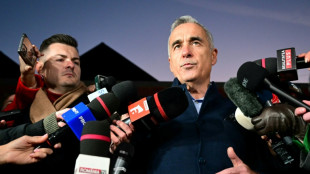
-
 Attack-minded Spurs boss Postecoglou says: 'You'll miss me when I'm gone'
Attack-minded Spurs boss Postecoglou says: 'You'll miss me when I'm gone'
-
Syria jihadists, allies shell major city Aleppo in shock offensive

-
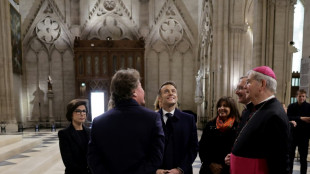 Macron inspects 'sublime' Notre Dame after reconstruction
Macron inspects 'sublime' Notre Dame after reconstruction
-
Arsenal must be near-perfect to catch Liverpool, says Arteta

-
 Arrests, intimidation stoke fear in Pakistan's politics
Arrests, intimidation stoke fear in Pakistan's politics
-
Showdown looms on plastic treaty days before deadline
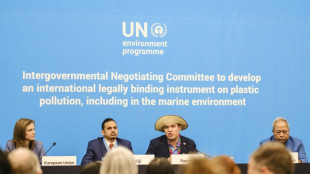
-
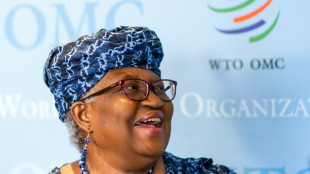 Ngozi Okonjo-Iweala: the WTO's trailblazing motivator
Ngozi Okonjo-Iweala: the WTO's trailblazing motivator
-
WTO chief reappointed as Trump threat looms

-
 US landmine offer to Ukraine throws treaty into 'crisis': campaign group
US landmine offer to Ukraine throws treaty into 'crisis': campaign group
-
British MPs debate contentious assisted dying law

-
 Macron offers first glimpse of post-fire Notre Dame
Macron offers first glimpse of post-fire Notre Dame
-
Syria jihadists, allies shell Aleppo in shock offensive

-
 Japan government approves $92 bn extra budget
Japan government approves $92 bn extra budget
-
Toll in Syria jihadist-army fighting rises to 242: monitor

-
 UK transport secretary quits in setback for Starmer
UK transport secretary quits in setback for Starmer
-
Days before deadline, plastic treaty draft highlights disagreement
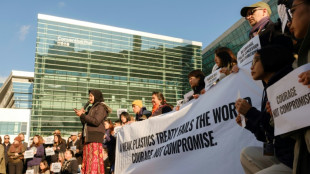
-
 Crypto boss eats banana art he bought for $6.2 million
Crypto boss eats banana art he bought for $6.2 million
-
Teen news boss criticises Australian social media ban

-
 Taiwan detects 41 Chinese military aircraft, ships ahead of Lai US stopover
Taiwan detects 41 Chinese military aircraft, ships ahead of Lai US stopover
-
Spain urged to 'build differently' after deadly floods

-
 WTO chief faces heavy task as Trump threat looms
WTO chief faces heavy task as Trump threat looms
-
Herbert takes control at Australian Open as Smith tanks

-
 Israel PM again warns Iran after top diplomat talks of revising nuclear doctrine
Israel PM again warns Iran after top diplomat talks of revising nuclear doctrine
-
Brilliant Brook's 132 puts England on top against sloppy New Zealand

-
 Brilliant Brook's 132 puts England on top against New Zealand
Brilliant Brook's 132 puts England on top against New Zealand
-
US landmine offer to Ukraine throws global treaty into 'crisis': campaign group

-
 Singapore hangs 4th person in three weeks
Singapore hangs 4th person in three weeks
-
Five things to know about NewJeans' shock split from agency

-
 Waste pickers battle for recognition at plastic treaty talks
Waste pickers battle for recognition at plastic treaty talks
-
Ireland votes in closely fought general election

-
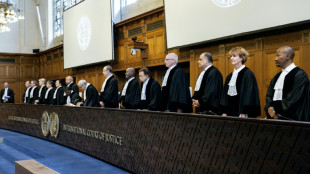 Top UN court to open unprecedented climate hearings
Top UN court to open unprecedented climate hearings
-
European countries that allow assisted dying

-
 British MPs to debate contentious assisted dying law
British MPs to debate contentious assisted dying law
-
Schmidt not expecting hero's welcome on Ireland return

-
 PSG stuck between domestic dominance and Champions League woes
PSG stuck between domestic dominance and Champions League woes
-
'Hot fight' as unbeaten Bayern visit Dortmund fortress

-
 Bordeaux-Begles' Samu 'not finished yet' with Wallabies
Bordeaux-Begles' Samu 'not finished yet' with Wallabies
-
Brook and Pope half-centuries haul England to 174-4 against NZ

-
 Yen rallies on rate hike bets as equity markets swing
Yen rallies on rate hike bets as equity markets swing
-
Ukraine superstar Mahuchikh brings 'good vibes' to her war-torn country

-
 PlayStation at 30: How Sony's grey box conquered gaming
PlayStation at 30: How Sony's grey box conquered gaming
-
Saudi Arabia hosts UN talks on drought, desertification

-
 PlayStation: Fun facts to know as Sony's console turns 30
PlayStation: Fun facts to know as Sony's console turns 30
-
Nepal's first transgender candidates run for local office

-
 Father of PlayStation says 'everyone told us we would fail'
Father of PlayStation says 'everyone told us we would fail'
-
Ireland seek to overcome former coach Schmidt's Wallabies

-
 Detroit survive Bears comeback to make it 10 wins in a row
Detroit survive Bears comeback to make it 10 wins in a row
-
Mexican actor Silvia Pinal dead at 93

-
 'Black Friday' deals target inflation-weary US consumers
'Black Friday' deals target inflation-weary US consumers
-
Liverpool look to deepen Man City crisis, Amorim seeks first Premier League win


Laura Poitras: 'Good journalism is trouble-making'
Laura Poitras has made herself the conscience of the United States with groundbreaking films about the occupation of Iraq, tech surveillance, and now the opioid epidemic. She is proud to call herself a troublemaker.
"I think it's so important to document histories of struggle," the 59-year-old filmmaker told AFP during a visit to Paris to promote her latest film, "All the Beauty and the Bloodshed".
The documentary, which won the Golden Bear in Venice and is up for an Oscar on Sunday, tells the story of renowned photographer Nan Goldin and her fight to shame the Sackler family who own the pharmaceutical firm behind painkiller Oxycontin, blamed for hundreds of thousands of deaths.
From the Oscar-winning "Citizenfour" about whistle-blower Edward Snowden, to "Risk" about Wikileaks founder Julian Assange, and "My Country, My Country" about the US occupation of Iraq, she sees all her films as "an indictment of US power and the US government".
In the case of her new film, "we have a company and a family that have been promoting a drug that is getting people addicted and causing mass overdoses, and (the government) did nothing, and there was evidence going back two decades that it was killing people," she said.
Though she was nervous about sharing the most intimate details of Goldin's traumatic life, it was naturally a less terrifying process than her work on "Citizenfour".
"This was more of a collaboration than my relationship with Edward Snowden," she said.
"In both cases there was a huge responsibility... but with Edward Snowden I literally had his life in my hands. If I made a mistake he could be imprisoned or worse."
- 'Outrageous' -
Born into a wealthy family in Boston, it was the aftermath of the attacks of September 11, 2001 that catalysed Poitras's career.
"Watching this kind of global dominance and occupation and torture and 'black sites' -- these things were outrageous and I guess I felt I needed to respond to that," she said.
"Good journalism should be troublemaking. Bad journalism is about getting access to power... those people aren't really troublemakers."
Although her portrait of Assange in 2017's "Risk" was far from entirely positive, she says the efforts to extradite him to the United States as "the biggest threat to journalism today".
"I'm guilty of violating the Espionage Act. If you're going to target Julian then you're targeting anyone who's done national security reporting and exposed documents.
"People have been so silent (on Assange's case). Europe should step in and provide asylum," she added.
Though protected by her status as a journalist, she has faced harassment -- placed on a watchlist following the release of 2006's "My Country, My Country", leading to frequent detentions for questioning at airports.
"I think I hit a nerve, but I'm proud that I hit the nerve," she said.
Does she think the Biden administration is still watching her?
"That's a question for the government," she said with a smile.
I.Meyer--BTB


